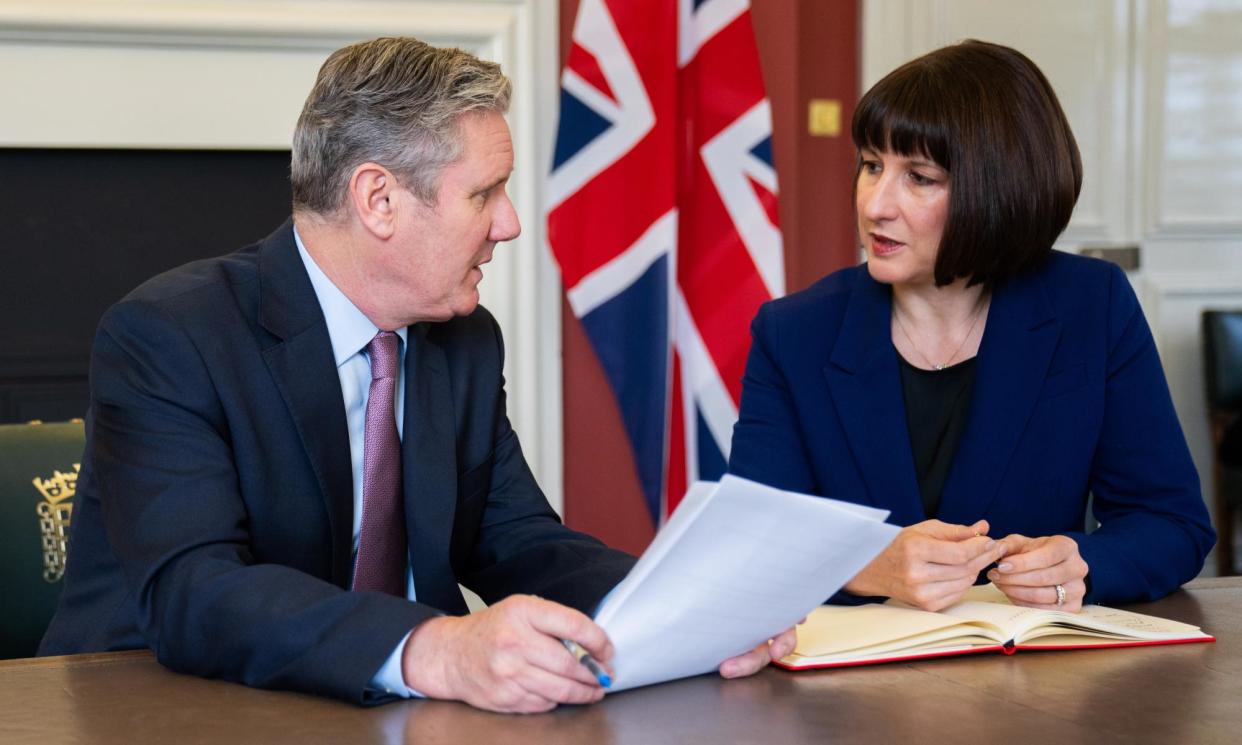Keir Starmer considers scaling back Labour’s £28bn green plans

Labour is considering scaling back ambitious plans to borrow £28bn a year to invest in green jobs and industry amid fears the Conservatives will use the policy as a central line of attack in the general election campaign.
The Guardian understands that Keir Starmer and Rachel Reeves will discuss the party’s flagship economic policy next month, with senior Labour figures pushing to drop the £28bn commitment entirely while others want to retain key elements of the plan.
Labour officials say they intend to keep central parts of their green policy, but want to recast them in a way that allows them to stop talking so much about what they cost, focusing instead on what the policies will achieve.
One insider said some were concerned about how a Labour government would grow the economy without the green plan, and whether it could be politically damaging for Starmer as it could leave him open to charges of “flip-flopping” by the Tories.
But they added: “There will be a pivot in the new year and the £28bn price tag as it exists now is unlikely to survive that. Whatever ultimately happens will be a further watering down of the position. This will be the Tories’ number one area of attack so they need to deal with it.”
It comes after Reeves delayed plans in June for the green fund to start in the first year of a Labour government, saying it would “ramp up” by the middle of a first parliament, as the party leadership looked to review its spending in an attempt to prove its fiscal credibility.
Many Labour officials are irritated that they have to defend the £28bn figure without being able to say how the money will be spent. Reeves has already been focusing on the outcomes of the investment, rather than its cost, which she did not mention in her Labour conference speech this autumn.
Even Ed Miliband, the shadow energy secretary, is said to appreciate the political risks of the £28bn figure. He has focused on talking about the benefits of the scheme such as lower household bills.
One way to refocus attention on the scheme, said one shadow minister, would be to wrap the existing plans into one bill with a title that could mimic the Inflation Reduction Act in the US. “We could call it the ‘Bringing Bills Down Act’,” the person said.
Others, however, believe rebadging the scheme will not be enough, and want the overall financial commitment to be scaled back, perhaps dramatically. Labour insiders said these included Pat McFadden, the shadow Cabinet Office minister; Morgan McSweeney, Labour’s campaign chief; and the shadow Treasury minister, Spencer Livermore.
The plan is already hampered by the fact that Reeves has said it will only be achieved if it fits with Labour’s promise to have debt falling as a share of gross domestic product at the end of a five-year period. Her team have stressed that the fiscal rules are paramount.
After the autumn statement, there is an extra £13bn to spend while still meeting that target, but the government is expected to eat into that with further tax cuts in the spring budget.
Labour has said it will take into account money already committed to green projects by the Conservative government, which is around £8bn, leaving the party with a further £20bn to find if it wants to retain the original pledge.
The party is likely to stick to the spending commitments it has already made, to fund a national wealth fund at a cost of £8bn over the parliament and a home insulation scheme at a cost of up to £6bn a year.
Labour has also promised an extra £1.4bn for a range of smaller schemes, including investments in clean steel technologies and battery power production.
Some Labour officials want the party to go no further, even though those schemes, added to the money already committed by the government, would take the party to a commitment of spending about £16bn a year by the end of the next parliament.
More money would be available through Labour’s tougher version of the energy windfall tax, which is forecast to raise an extra £10.4bn a year.
The party has previously said that if it were in power now, it would use that money for energy price support or a council tax freeze. However, they have not yet said what they would use it for after the next election, leaving the funds technically unallocated.
Others in the party want Labour to be ambitious and stick to its original £28bn pledge, while spelling out in more detail how it would be spent. They point out that the idea of a publicly owned energy generation company is overwhelmingly popular, winning the support of nearly 80% of voters.
They also point out that with spiralling energy costs, the party should be making the case even more vociferously for clean power generation.
Youth campaign group Green New Deal Rising was among those urging Labour to stick to the figure. Hannah Martin, its co-director, said: “Without the £28bn, Starmer has no plan for growth. Starmer’s failure to find a backbone and stick to his pledges won’t be forgiven or forgotten by this generation, and will have real consequences for Labour at the ballot box.”
Rishi Sunak and his ministers have already begun to weaponise the major Labour spending commitment, regularly raising it at prime minister’s questions and arguing that it could result in tax rises in a move to undermine the opposition’s fiscal credibility.

 Yahoo News
Yahoo News 
